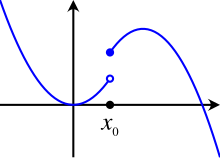
In convex analysis, the Fenchel–Moreau theorem (named after Werner Fenchel and Jean Jacques Moreau) or Fenchel biconjugation theorem (or just biconjugation theorem) is a theorem which gives necessary and sufficient conditions for a function to be equal to its biconjugate. This is in contrast to the general property that for any function . This can be seen as a generalization of the bipolar theorem. It is used in duality theory to prove strong duality (via the perturbation function).
Statement
Let be a Hausdorff locally convex space, for any extended real valued function it follows that if and only if one of the following is true
- is a proper, lower semi-continuous, and convex function,
- , or
- .
References
- ^ Borwein, Jonathan; Lewis, Adrian (2006). Convex Analysis and Nonlinear Optimization: Theory and Examples (2 ed.). Springer. pp. 76–77. ISBN 9780387295701.
- Zălinescu, Constantin (2002). Convex analysis in general vector spaces. River Edge, NJ: World Scientific Publishing Co., Inc. pp. 75–79. ISBN 981-238-067-1. MR 1921556.
- Hang-Chin Lai; Lai-Jui Lin (May 1988). "The Fenchel-Moreau Theorem for Set Functions". Proceedings of the American Mathematical Society. 103 (1). American Mathematical Society: 85–90. doi:10.2307/2047532. JSTOR 2047532.
- Shozo Koshi; Naoto Komuro (1983). "A generalization of the Fenchel–Moreau theorem". Proc. Japan Acad. Ser. A Math. Sci.. 59 (5): 178–181.
| Convex analysis and variational analysis | |
|---|---|
| Basic concepts | |
| Topics (list) | |
| Maps | |
| Main results (list) | |
| Sets | |
| Series | |
| Duality | |
| Applications and related | |
| Functional analysis (topics – glossary) | |||||
|---|---|---|---|---|---|
| Spaces |
| ||||
| Theorems | |||||
| Operators | |||||
| Algebras | |||||
| Open problems | |||||
| Applications | |||||
| Advanced topics | |||||
| Topological vector spaces (TVSs) | |
|---|---|
| Basic concepts | |
| Main results | |
| Maps | |
| Types of sets | |
| Set operations | |
| Types of TVSs |
|
 . This can be seen as a generalization of the
. This can be seen as a generalization of the  be a
be a  it follows that
it follows that  if and only if one of the following is true
if and only if one of the following is true
 is a
is a  , or
, or .
.